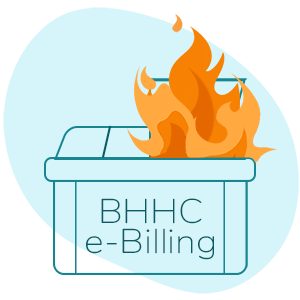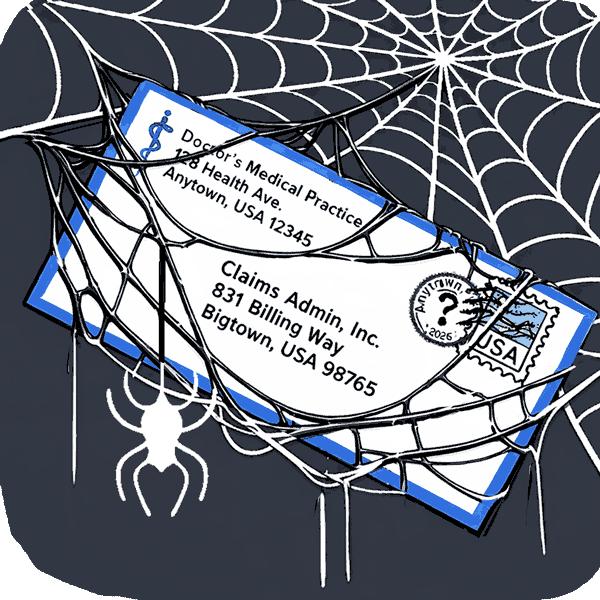Berkshire Hathaway Ignores CA e-Billing Mandate

Berkshire Hathaway Homestate Companies (BHHC) consistently fails to comply with basic workers’ comp electronic billing mandates. In that failure, BHHC undermines the purpose of workers’ comp e-billing, which California legislators enacted to reduce friction, conserve resources, and make the treatment of injured workers more efficient.
Our data indicates that in at least 4,353 cases (and counting), BHHC responded to providers’ e-bills with untimely, invalid electronic ‘277’ acknowledgments rejecting compliant e-bills for processing.
While BHHC compliantly sent providers timely 277 acknowledgements accepting those e-bills, BHHC subsequently sent providers untimely and invalid 277 acknowledgements rejecting the same (previously accepted) e-bills.
As of this writing, BHHC’s improper e-bill rejections continues. Accordingly, daisyBill submitted 4,353 formal Audit Complaints to the Division of Workers’ Compensation (DWC) for all 4,353 bills.
We intend to pursue both full reimbursement for these e-bills (and every e-bill BHHC fails to pay going forward) and all penalty and interest payments BHHC owes as a result of untimely reimbursement (daisyBill software records the due date of payment for each e-bill and will calculate the penalties and interest accordingly).
By failing to process these e-bills, even after repeated outreach from daisyBill, BHHC places an undue strain on workers’ comp providers. BHHC’s choice to ignore California law also usurps the regulatory role of the DWC. By picking and choosing which e-billing requirements to ignore, BHHC joins the ranks of claims administrators anointing themselves their own phantom regulators — and a very poor one at that.
BHHC e-Billing Non-Compliance
California e-billing regulations require the claims administrator to send e-billing providers an electronic acknowledgement that alerts the provider whether or not the e-bill submission is complete and will be processed by the claims administrator.
Regulations require the claims administrator to send the acknowledgment in the form of an X12 277 file within 2 business days after receiving the e-bill.
For the first half of 2021, Jopari served as BHHC’s clearinghouse, accepting provider e-bills and returning 277s to the provider on behalf of BHHC. Thereafter, Carisk served as BHHC’s clearinghouse. However, regardless of clearinghouse, bill review, or other vendors BHHC engages to facilitate their e-bill processing, BHHC is 100% responsible for complying with e-billing requirements as the claims administrator.
As a single example, Carisk initially returned timely 277 acknowledgments indicating an e-bill was accepted and forwarded to BHHC for processing. In fact, Carisk returned four (!) redundant 277 ‘accept’ acknowledgments. Then weeks later, Carisk sent the provider an untimely and invalid 277 ‘reject’ acknowledgment deeming the e-bill “unprocessable.”
Below is a screenshot from the daisyBill software showing the four 277 Accept acknowledgments for the e-bill — followed weeks later by a 277 Reject acknowledgment. In this way, over the course of 2021, BHHC improperly rejected 4,085 e-bills submitted by daisyBill provider clients. In addition, for Q1 2022, BHHC improperly rejected 268 e-bills, for a grand total of 4,353 e-bills.
BHHC Ignores CA Law (and daisyBill)
To alert BHHC to its lack of compliance, on 12/13/2021 and 12/23/2021, daisyBill emailed 14 (!) separate BHHC representatives. In both instances, BHHC failed to respond.
In addition, daisyBill published the following articles reporting BHHC’s ongoing failures:
- 12/7/2021: Berkshire Hathaway Refuses 892 Second Review Appeals
- 1/12/2022: Berkshire Hathaway Ignores THOUSANDS of Second Review Appeals (& CA Law)
- 1/13/2022: Berkshire Hathaway: DWC Targeted Audit Needed ASAP
As of this writing, BHHC has offered zero response or indication of taking any substantive action to correct the problem.
Due to the lack of any response from BHHC (or even apparent concern), daisyBill submitted 4,353 Audit Complaints to the DWC Audit Unit to report the insurer’s 277 non-compliance. The Audit Complaints represent each instance from January 1, 2021 through March 31, 2022, where BHHC, through either Jopari or Carisk, returned an untimely and invalid 277 Reject acknowledgment.
BHHC Acting as Phantom Regulator
Claims administrators like BHHC openly refuse to submit to reasonable California workers’ comp laws and regulations. This leaves few options for providers trying to treat injured workers, other than abandoning workers’ comp altogether.
Without decisive action to curb BHHC’s non-compliance with California law, it is clear that the 277 mandate is yet another requirement that claims administrators — in their usurped role as phantom regulators of their own business practices — can disregard.
If the DWC is not equipped to properly challenge BHHC, California legislators can watch from the sidelines as the laws they created are systematically disregarded by claims administrators.
CA e-Billing Laws, Regulations, and Rules Violated by BHHC
Timely sending a valid 277 acknowledgment is not optional in California. Section 7.1 of the DWC Medical Billing and Payment Guide states:
“ASC X12C/005010X214 Health Care Claim Acknowledgment (277) — within two working days of receipt of an electronically submitted bill, the claims administrator shall send a Health Care Claim Acknowledgment 005010X214 electronic notice of whether or not the bill submission is complete.” [emphasis added]
BHHC Violations Warrant A TARGETED Audit
We believe that BHHC’s behavior constitutes a disregard for workers’ comp requirements that meets the standards for a DWC Targeted Audit. LAB §129(b)(3) empowers the DWC to conduct either a “targeted profile audit review” or “full compliance audit” at any time, based on information from:
“...reliable sources providing factual information that indicates an insurer, self-insured employer, or third-party administrator is failing to meet its obligations…”
Pursuant to LAB §129, CCR §10106.1(c)(3) provides the DWC Audit Unit may target audit subjects based on:
“...credible complaints and/or information received by the Division of Workers' Compensation that indicate possible claims handling violations…”
daisyBill has submitted 4,353 reliable and credible Audit Complaints to the DWC regarding BHHC’s apparent business practice of violating California e-billing requirements.
BHHC Subject to Audit Penalties
Per §7.2 of the DWC Guide, audit penalties under California Code of Regulations (CCR) Section 10111.2(b)(10),(11) apply to BHHC.
Audit penalties are separate and distinct from penalty and interest payments owed to the provider; while penalty and interest payments are automatic and “self-executing” by BHHC, audit penalties are only due if the DWC selects the claim for audit.
Where the e-bill remains unpaid (or compliantly objected to) at the time the DWC notifies BHHC that the claim was selected for audit, the penalty is:
- $100 for each bill of $100 or less, excluding interest and penalty
- $200 for each bill of more than $100, but no more than $500, excluding interest and penalty
- $300 for each bill of more than $500, but no more than $1,000, excluding interest and penalty
- $500 for each bill of more than $1,000, excluding interest and penalty
The above payments are doubled when the treatment was authorized by a reviewer, as defined by CCR §9792.6(q), through a utilization review (UR) process established pursuant to LAB §4610 and CCR §9792.7.
Where BHHC paid the bill before receiving notification that the DWC selected the claim for audit, the penalty for each failure to pay is:
- $100 for each bill that included an increase and interest with the late payment
- $200 for each bill that included either an increase or interest with the late payment
- $300 for each bill that included neither an increase nor interest with the late payment
Administrative and Civil Penalties
LAB §129.5 allows the AD to assess administrative penalties against claims administrators, ranging from $100 to $5,000 per violation, for failure to comply with any rule or regulation of the AD. The AD must give “due consideration” to:
- The gravity of the violation: BHHC blatantly and repeatedly disregarded a key e-billing requirement.
- The good faith of the claims administrator: it is inconceivable that BHHC was unaware of its obligations, especially after repeated daisyBill outreach.
- The frequency of the violations: BHHC committed the same violation 4,353 times between January 1, 2021 and March 31, 2022.
In addition, the AD may assess a civil penalty of up to $100,000 against a claims administrator if:
“Upon finding, after hearing, that an employer, insurer, or third-party administrator has knowingly committed, or performed with enough frequency as to indicate a general business practice…a refusal to comply with known and legally indisputable compensation obligations [emphasis added].”
daisyBill fights the good fight on behalf of workers’ comp providers. Reach out to see how we can help your practice obtain fast, correct reimbursement for treating injured workers.
LET’S TALK
DaisyBill provides content as an insightful service to its readers and clients. It does not offer legal advice and cannot guarantee the accuracy or suitability of its content for a particular purpose.




